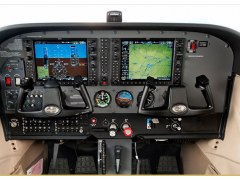Whether you fly for recreation or as a career, the most important pilot rating you can earn is the instrument rating. This program normally follows the Private Pilot course. The instrument rating greatly expands your weather options on trips, increases the level of safety when you’re flying, improves your precision piloting skills and raises your level of self – confidence. Even if you don’t fly often enough to maintain safe instrument pilot proficiency, your visual flight skills and level of competency flying at night will be greatly enhanced.
Federal regulations require at least a Private Pilot certificate for enrollment and at least 35 hours of instrument flight training (up to 10 hours in our simulator can be counted toward this requirement). At American Air, you will also receive at least 72 hours of in – depth classroom ground instruction. Students who take 2 – 3 flight lessons per week on average complete the course at AAFT with over 110 hours of flight training (approximately 15 -20 hours of this time is in our simulator). Students will typically require approximately 10 months to complete this course.
Most of the flight training in this course is conducted in the Cessna 172S with a glass cockpit. Some of the training is conducted in the Cessna 172 and our simulator with analog instruments, so you will be comfortable flying on instruments with either type of cockpit. Our program includes actual instrument weather flight, night instrument flight, extensive complex emergency instrument flight, aeronautical decision making, accident analysis, aircraft systems, flight principles, aeromedical factors, weather analysis, airspace, federal aviation regulations, cross – country planning and flying, navigation – including GPS, charts and crew / cockpit resource management. Each subject is covered in much greater depth than any printed or video material provides. You will be trained and tested to a much higher standard than the minimum standard required by FAA regulations. Pilots will find this course challenging, interesting and enjoyable!





